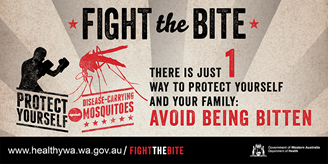Published on Friday, 18 May 2018 at 12:00:00 AM
The Department of Health is reminding residents and travellers in the north of Western Australia to take precautions to avoid mosquito bites. The warning follows further evidence of ongoing activity of Murray Valley encephalitis (MVE) and Kunjin virus in the Kimberley and Pilbara regions.
WA Health’s Acting Medical Entomologist, Dr Andrew Jardine, said while no human cases of MVE have been reported in WA since 2011, further evidence of the virus has been detected in sentinel chicken flocks, which are used as an early warning system for virus activity.
“MVE virus is only carried by mosquitoes, and while the risk of being infected and becoming unwell is low, the illness can be severe.
“Although recent mosquito monitoring by the Department found that mosquito numbers in some parts of the Kimberley and Pilbara are dropping with the onset of the northern dry season, the sentinel chicken results mean that it is still important that people continue to protect themselves from mosquito bites.”
“People do not need to alter their plans to visit the Kimberley or Pilbara regions, but it is important they take some simple steps to avoid mosquito bites when camping, fishing or undertaking any other activity outdoors,” Dr Jardine said.
Mosquito Management Plan
The Shire of Ashburton has a comprehensive mosquito management plan, which includes the regular treatment of larvicide to existing and potential mosquito breeding habitats. Routine larviciding of natural and man-made drains, water retention basins, sumps to prevent mosquito breeding has a big impact on the reduction of mosquito populations.
The Shire will also fog in different areas when needed, to knock down adult mosquitoes. As fogging only lasts for an hour or so, it is timed for dusk when mosquitoes are most active.
Mosquito borne diseases
Initial symptoms of MVE include fever, drowsiness, headache, stiff neck, nausea and dizziness. People experiencing these symptoms should seek medical advice quickly. In severe cases, people may experience fits, lapse into a coma, and may be left with permanent brain damage or die.
In young children, fever might be the only early sign, so parents should see their doctor if concerned, particularly if their child experiences drowsiness, floppiness, irritability, poor feeding, or general distress.
Kunjin virus usually caused milder symptoms than MVE virus, but in rare cases could also cause severe symptoms, including headache, neck stiffness, fever, delirium and coma.
There are no specific cures or vaccines for MVE or Kunjin virus so it is important that people take care to prevent being bitten by mosquitoes.
Protect yourselves and Fight the Bite
The best protection against mosquito borne virus is to avoid getting bitten. Simple steps to avoid mosquito bites are:
- avoid outdoor exposure around dawn and early evening
- wear protective (long, loose-fitting, light-coloured) clothing when outdoors
- apply a personal repellent containing diethyl toluamide (DEET) or picaridin to exposed skin or clothing. The most effective and long-lasting formulations are lotions or gels. Natural or organic repellents are generally not as effective as DEET or picaridin or need to be reapplied more frequently.
- use mosquito coils and mosquito lanterns and apply barrier sprays containing bifenthrin in patio and outdoor areas around houses
- ensure insect screens are installed and in good condition on houses and caravans
- use mosquito nets and mosquito-proof tents when camping
- ensure infants and children are adequately protected against mosquito bites, preferably with suitable clothing, bed nets or other forms of insect screening.
If you have any concerns please don’t hesitate to contact the Shire on 9188 4444.
Remember to be vigilant and ‘Fight the Bite’.

Back to All News